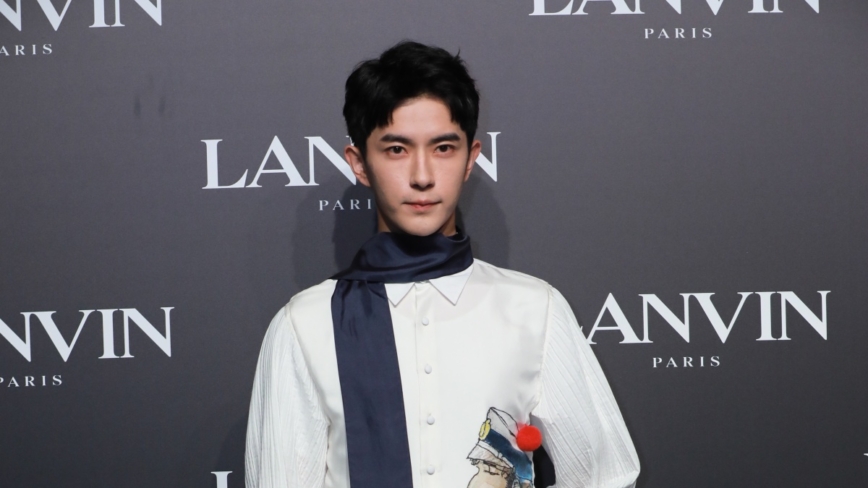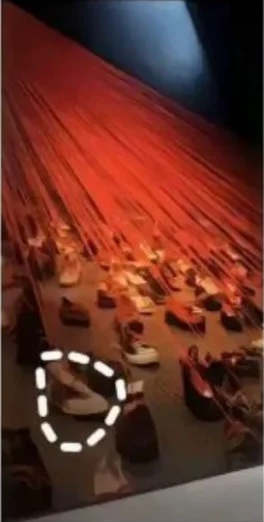Direct translation
Bulgari Hotel is affiliated with a state-owned enterprise. Is Yu Menglong's case implicated in live organ harvesting?
Editor : Shang Chuan / https://www.ntdtv.com/gb/2025/10/18/a104030875.html / Image : On 17 October 2020, actor Yu Menglong attended a Lanvin brand event in Shanghai. (VCG/VCG via Getty Images)

The case of mainland actor Yu Menglong is deepening. Rumors suggest that the Bulgari Hotel in Beijing and the Qihao Art Museum involved in the case are both affiliated with Beijing state-owned enterprises. The museum was revealed to have exhibited human specimens, raising questions about its connection to the CCP's live organ harvesting.
Amidst this public attention, the Bulgari Hotel hosted a Ferrari car show from 17 to 18 October 2025, sparking renewed speculation. Previously, rumours circulated online that the Bulgari Hotel and the adjacent Qihao Art Museum might be the suspected imprisonment site for Yu Menglong. Recently, reports, both verifiable and untrue, claimed that Yu Menglong's remains were still hidden in the hotel's basement. This has led some to question whether the hotel was using the auto show as a cover to divert evidence.
Public information shows that the Bulgari Hotel and Qihao Art Museum were invested and built by Qihao Xingye (Beijing) Co., Ltd. Qihao Xingye is a wholly-owned subsidiary of Hualong Tourism Industry Co., Ltd., which in turn is a wholly-owned subsidiary of Beijing Tourism Group Co., Ltd., a local state-owned enterprise wholly owned by the Beijing State-owned Assets Supervision and Administration Commission of the Communist Party of China. This means that both the Bulgari Hotel and Qihao Art Museum are officially owned.
According to the official website of Beijing Tourism Group, in January 2022, the group's general manager, Bai Fan, visited the Qihao Beijing office building, the Bulgari Hotel, and other businesses for an "on-site inspection" and received work reports.
According to earlier reports from netizens, the Bulgari Hotel and Qihao Art Museum are located adjacent to each other and connected by an underground passage.
In addition to the Qihao Art Museum, rumors are circulating online linking the Beijing Red Brick Art Museum and the 798 Art District to the Yu Menglong case. Netizens are reviewing the gruesome exhibits at these three locations, raising strong questions about whether they include numerous human body parts and even human skin specimens. Because the case involves the shady dealings of the entertainment industry, many suspect these specimens may be from mainland Chinese celebrities who have previously died under mysterious circumstances.
Image : Netizens suspect that the shoes on display at the 798 Art District may contain belongings of slain celebrities like Yu Menglong. (Screenshot)
One exhibit that has caught the attention of netizens is a display of hundreds of red threads resembling capillaries, each tied to an old shoe of varying styles. Netizens suspect that if these shoes are the remains of the deceased, then the sheer number of shoes could extend beyond celebrity involvement and could potentially be linked to large-scale kidnappings and killings, or even the CCP's widespread organ harvesting. The fact that the Bulgari Hotel and the Qihao Art Museum are state-owned enterprises raises further questions about the involvement of a state-sponsored black market.
Previous online rumours claimed that these locations involved in the case had ample underground space, used to imprison Yu Menglong and others.
In preparation for war against the Soviet Union in the last century, the Chinese Communist Party (CCP) excavated numerous underground air-raid shelters in major cities. Today, many of these underground facilities have become locations for the CCP to commit various covert crimes. In 2006, the underground concentration camp at Shenyang's Sujiatun Hospital, where Falun Gong practitioners were detained as organ donors, was exposed. Subsequently, a veteran military doctor from the Shenyang Military Region revealed to The Epoch Times that the Sujiatun underground concentration camp held tens of thousands of people at its peak, and was just one of dozens of similar camps across China.
Two current leads point to a possible connection between Yu Menglong's case and the CCP's live organ harvesting industry.
One involves human specimens. Currently, exhibition halls across China display a variety of horrific plastination specimens. This human specimen industry originated in Dalian, almost simultaneously with the large-scale live organ harvesting of Falun Gong practitioners there.
The CCP began persecuting Falun Gong practitioners in 1999. Bo Xilai, then the mayor of Dalian, spearheaded the live organ harvesting of Falun Gong practitioners. At the same time, his wife, Gu Kailai, oversaw the establishment of two factories, Dalian Hagens Biological and Dalian Hongfeng Biological, to mass-produce human plastinates, which were sold at high prices or exhibited domestically and internationally. Numerous evidence indicates that the bodies used for these specimens were primarily Falun Gong practitioners, including those whose organs had been harvested alive.
Another clue concerns those involved in the Yu Menglong case. Rumours are circulating online that entertainment mogul Tian Hairong is involved but she denies the allegations. Tian Hairong's ex-husband was Xu Ming, the head of Dalian Shide Group. Xu Ming was once Bo Xilai's "chief financial officer" and died suddenly in prison after Bo's downfall.




No comments:
Post a Comment